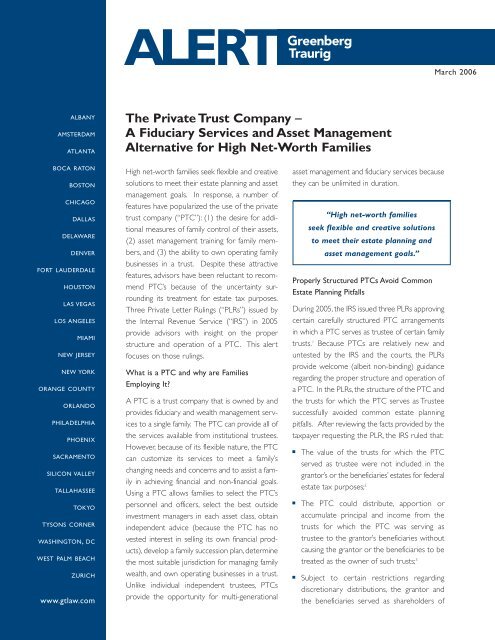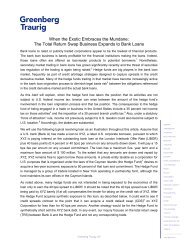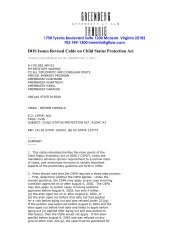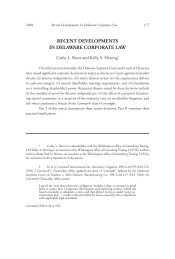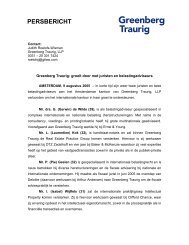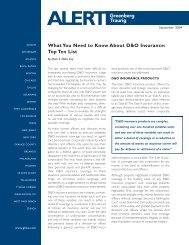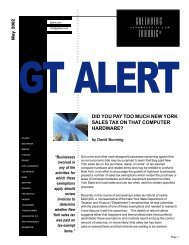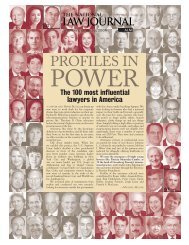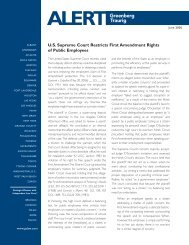The Private Trust Company - Greenberg Traurig LLP
The Private Trust Company - Greenberg Traurig LLP
The Private Trust Company - Greenberg Traurig LLP
You also want an ePaper? Increase the reach of your titles
YUMPU automatically turns print PDFs into web optimized ePapers that Google loves.
ALBANY<br />
AMSTERDAM<br />
ATLANTA<br />
BOCA RATON<br />
BOSTON<br />
CHICAGO<br />
DALLAS<br />
DELAWARE<br />
DENVER<br />
FORT LAUDERDALE<br />
HOUSTON<br />
LAS VEGAS<br />
LOS ANGELES<br />
MIAMI<br />
NEW JERSEY<br />
NEW YORK<br />
ORANGE COUNTY<br />
ORLANDO<br />
PHILADELPHIA<br />
PHOENIX<br />
SACRAMENTO<br />
SILICON VALLEY<br />
TALLAHASSEE<br />
TOKYO<br />
TYSONS CORNER<br />
WASHINGTON, DC<br />
WEST PALM BEACH<br />
ZURICH<br />
www.gtlaw.com<br />
<strong>The</strong> <strong>Private</strong> <strong>Trust</strong> <strong>Company</strong> –<br />
A Fiduciary Services and Asset Management<br />
Alternative for High Net-Worth Families<br />
High net-worth families seek flexible and creative<br />
solutions to meet their estate planning and asset<br />
management goals. In response, a number of<br />
features have popularized the use of the private<br />
trust company (“PTC”): (1) the desire for additional<br />
measures of family control of their assets,<br />
(2) asset management training for family members,<br />
and (3) the ability to own operating family<br />
businesses in a trust. Despite these attractive<br />
features, advisors have been reluctant to recommend<br />
PTC’s because of the uncertainty surrounding<br />
its treatment for estate tax purposes.<br />
Three <strong>Private</strong> Letter Rulings (“PLRs”) issued by<br />
the Internal Revenue Service (“IRS”) in 2005<br />
provide advisors with insight on the proper<br />
structure and operation of a PTC. This alert<br />
focuses on those rulings.<br />
What is a PTC and why are Families<br />
Employing It?<br />
A PTC is a trust company that is owned by and<br />
provides fiduciary and wealth management services<br />
to a single family. <strong>The</strong> PTC can provide all of<br />
the services available from institutional trustees.<br />
However, because of its flexible nature, the PTC<br />
can customize its services to meet a family’s<br />
changing needs and concerns and to assist a family<br />
in achieving financial and non-financial goals.<br />
Using a PTC allows families to select the PTC’s<br />
personnel and officers, select the best outside<br />
investment managers in each asset class, obtain<br />
independent advice (because the PTC has no<br />
vested interest in selling its own financial products),<br />
develop a family succession plan, determine<br />
the most suitable jurisdiction for managing family<br />
wealth, and own operating businesses in a trust.<br />
Unlike individual independent trustees, PTCs<br />
provide the opportunity for multi-generational<br />
asset management and fiduciary services because<br />
they can be unlimited in duration.<br />
“High net-worth families<br />
seek flexible and creative solutions<br />
to meet their estate planning and<br />
asset management goals.”<br />
Properly Structured PTCs Avoid Common<br />
Estate Planning Pitfalls<br />
During 2005, the IRS issued three PLRs approving<br />
certain carefully structured PTC arrangements<br />
in which a PTC serves as trustee of certain family<br />
trusts. 1 Because PTCs are relatively new and<br />
untested by the IRS and the courts, the PLRs<br />
provide welcome (albeit non-binding) guidance<br />
regarding the proper structure and operation of<br />
a PTC. In the PLRs, the structure of the PTC and<br />
the trusts for which the PTC serves as <strong>Trust</strong>ee<br />
successfully avoided common estate planning<br />
pitfalls. After reviewing the facts provided by the<br />
taxpayer requesting the PLR, the IRS ruled that:<br />
� <strong>The</strong> value of the trusts for which the PTC<br />
served as trustee were not included in the<br />
grantor’s or the beneficiaries’ estates for federal<br />
estate tax purposes; 2<br />
� <strong>The</strong> PTC could distribute, apportion or<br />
accumulate principal and income from the<br />
trusts for which the PTC was serving as<br />
trustee to the grantor’s beneficiaries without<br />
causing the grantor or the beneficiaries to be<br />
treated as the owner of such trusts; 3<br />
� Subject to certain restrictions regarding<br />
discretionary distributions, the grantor and<br />
the beneficiaries served as shareholders of<br />
March 2006
the PTC and participated in the daily activities<br />
of the PTC without causing the value of the<br />
trusts to be included in their estates for federal<br />
estate tax purposes; 4 and<br />
� For generation-skipping transfer tax purposes,<br />
naming a PTC as trustee did not adversely impact<br />
a trust’s exempt status. 5<br />
Preferred PTC Structure Based on PLRs<br />
<strong>The</strong> three PLRs seem to provide the boundaries for<br />
structuring the PTC – from most restrictive to<br />
somewhat flexible. <strong>The</strong> PTCs examined in the PLRs<br />
included the following key features:<br />
� <strong>The</strong> board of directors had at least one board<br />
member that was not a family member, or a<br />
grantor of, a donor to, or a current or contingent<br />
beneficiary of a trust (i) of which any family<br />
member was a grantor, donor, or current or<br />
contingent beneficiary and (ii) for which the<br />
trustee had any discretionary power (other<br />
than an investment power) that was not limited<br />
by an ascertainable standard; 6<br />
� In PLR 20053003, the board of directors<br />
appointed a Distribution Committee (a/k/a<br />
Discretionary Decisions Review Committee in<br />
PLRs 200546055 and 200548035) to make<br />
discretionary distributions of trust principal<br />
and income.<br />
� In all three PLRs, the Distribution Committee<br />
was subject to restrictions with regard to<br />
discretionary distributions of trust principal and<br />
income. <strong>The</strong> restrictions were critical in<br />
protecting the grantor and beneficiaries from<br />
causing the value of the trusts to be included in<br />
their estates for federal estate tax purposes.<br />
PLR 200523003 provided strict rules regarding the<br />
composition of the Distribution Committee. <strong>Trust</strong><br />
grantors (and their spouses) as well as current and<br />
contingent beneficiaries (and their spouses) were<br />
prohibited from serving on the Distribution<br />
Committee. Any person considered related or<br />
subordinate to a grantor or current or contingent<br />
beneficiary was also prohibited from serving on<br />
the Distribution Committee. No member of the<br />
Distribution Committee could participate in any<br />
discretionary decision with respect to any trust<br />
beneficiary to whom he or she owed a legal obligation<br />
of support. And the majority of the<br />
Distribution Committee members could not be<br />
employees or directors of the PTC.<br />
In contrast, PLRs 200546055 and 200548035 provided<br />
more flexibility with respect to discretionary<br />
distributions. Initial discretionary distribution decisions<br />
were made by PTC trust officers subject to<br />
review by senior trust officers. Upon the written<br />
request of a beneficiary, the Distribution<br />
Committee (appointed by the PTC’s board of<br />
directors and comprised of at least three directors)<br />
would review the discretionary distribution<br />
decisions made by the PTC trust officers. A variety<br />
of restrictions prevented this arrangement<br />
from causing estate tax inclusion for the grantor<br />
and beneficiaries. For example, discretionary distributions<br />
decisions were required to be made by<br />
non-family PTC trust officers, and PTC officers and<br />
directors were prohibited from participating in any<br />
discretionary distribution decision with respect to<br />
a trust if the officer or director, or his or her spouse,<br />
is a grantor, donor, or a current or contingent beneficiary;<br />
or if the officer or director, or his or her<br />
spouse, is a family member.<br />
Conclusion<br />
PTCs offer high net-worth families significant flexibility.<br />
Three recently issued PLRs provide important<br />
guidance for advisors on how to structure and<br />
operate a PTC in order to avoid common estate<br />
planning pitfalls. As a result of this guidance, PTCs<br />
may become more widely utilized.<br />
<strong>The</strong> <strong>Private</strong> <strong>Trust</strong> <strong>Company</strong> – A Fiduciary Services<br />
and Asset Management Alternative for High Net-Worth Families Page 2
Footnotes<br />
1 <strong>Private</strong> Letter Ruling 200523003, issued on June 10, 2005; <strong>Private</strong> Letter Ruling 200546055, issued on November 18, 2005; and<br />
<strong>Private</strong> Letter Ruling 200548035, issued on December 2, 2005.<br />
2 All three PLRs focus on inclusion of the trust in the grantor’s estate under IRC §§ 2036 and 2038 (regarding the retained right<br />
to affect the beneficial enjoyment of trust property and the retained right to alter or amend the trust) and inclusion of the trusts<br />
in the beneficiaries’ estates under IRC § 2041 (regarding general powers of appointment).<br />
3 All three PLRs analyze whether the PTC’s appointment as trustee or the PTC’s exercise of discretion regarding trust<br />
distributions causes trust beneficiaries to be treated as owners of the trusts under IRC § 678. <strong>The</strong>y also address this same issue<br />
with respect to the grantor under IRC §§ 677 and 674(a).<br />
4 <strong>The</strong>re was no inclusion in the grantor’s estate under IRC §§ 2036 or 2038 or the beneficiaries’ estates under IRC § 2041 because<br />
the structure and operation of the PTC prevented the grantor and the beneficiaries from participating directly or indirectly in<br />
decisions regarding discretionary distributions.<br />
5 In both PLR 200546055 and PLR 200548035, the IRS ruled that naming the PTC as trustee is an administrative change and will<br />
not be considered a shift in a beneficial interest in a trust to a beneficiary who occupies a lower generation and the change<br />
does not extend the time for vesting any beneficial interest. See, IRC § 26.2601-1(b)(4)(i)(D)(1).<br />
6 See, PLR 200546055 and PLR 200548035. PLR 200523003 provided that no more than half of the directors could be related or<br />
subordinate to the grantor.<br />
<strong>The</strong> <strong>Private</strong> <strong>Trust</strong> <strong>Company</strong> – A Fiduciary Services<br />
and Asset Management Alternative for High Net-Worth Families Page 3
PRACTICE AREAS<br />
ADA,Accessibility, Building and<br />
Life Safety Codes<br />
Antitrust and Trade Regulation<br />
Appellate<br />
Aviation and Aircraft Finance<br />
Business Immigration<br />
Business Reorganization and Bankruptcy<br />
Corporate and Securities<br />
Energy and Natural Resources<br />
Entertainment<br />
Environmental<br />
Executive Compensation and<br />
Employee Benefits<br />
Federal Marketing<br />
Financial Institutions<br />
Franchising<br />
Global Trade<br />
Government Contracts<br />
Governmental Affairs<br />
Health Business<br />
Hotel, Resort and Club<br />
Intellectual Property<br />
International<br />
Investment Funds<br />
Labor and Employment<br />
Land Development<br />
Life Sciences<br />
Litigation<br />
Public Finance<br />
Public Infrastructure<br />
Public Utility<br />
Real Estate<br />
Real Estate Investment <strong>Trust</strong>s<br />
Real Estate Operations<br />
Retail Industry Group<br />
Structured Finance and Derivatives<br />
Tax<br />
Technology, Media and Telecommunications<br />
<strong>Trust</strong>s and Estates<br />
1724-v3-0306-NAT-GTFIRM<br />
This Alert was written by Jonathan Forster, Rebecca Manicone and Jay R. Pelkofer<br />
in the Tysons Corner office. Please contact Mr. Forster or Ms. Manicone at<br />
703.749.1300, or your <strong>Greenberg</strong> <strong>Traurig</strong> liaison, if you have any questions<br />
regarding the subject matter of this Alert.<br />
Albany<br />
518.689.1400<br />
Amsterdam<br />
+ 31 20 301 7300<br />
Atlanta<br />
678.553.2100<br />
Boca Raton<br />
561.955.7600<br />
Boston<br />
617.310.6000<br />
Chicago<br />
312.456.8400<br />
Dallas<br />
972.419.1250<br />
Delaware<br />
302.661.7000<br />
Denver<br />
303.572.6500<br />
Fort Lauderdale<br />
954.765.0500<br />
Houston<br />
713.374.3500<br />
Las Vegas<br />
702.792.3773<br />
Los Angeles<br />
310.586.7700<br />
Miami<br />
305.579.0500<br />
New Jersey<br />
973.360.7900<br />
New York<br />
212.801.9200<br />
Orange County<br />
714.708.6500<br />
Orlando<br />
407.420.1000<br />
Philadelphia<br />
215.988.7800<br />
Phoenix<br />
602.445.8000<br />
Sacramento<br />
916.442.1111<br />
Silicon Valley<br />
650.328.8500<br />
Tallahassee<br />
850.222.6891<br />
Tokyo<br />
+ 81 3 3264 0671<br />
Tysons Corner<br />
703.749.1300<br />
Washington, D.C.<br />
202.331.3100<br />
West Palm Beach<br />
561.650.7900<br />
Zurich<br />
+ 41 1 364 26 00<br />
This <strong>Greenberg</strong> <strong>Traurig</strong> ALERT is issued for informational purposes only and is not intended to be construed or used as general legal advice.<strong>The</strong><br />
hiring of a lawyer is an important decision. Before you decide, ask for written information about the lawyer’s legal qualifications and experience.<br />
<strong>Greenberg</strong> <strong>Traurig</strong> is a trade name of <strong>Greenberg</strong> <strong>Traurig</strong>, <strong>LLP</strong> and <strong>Greenberg</strong> <strong>Traurig</strong>, P.A. ©2006 <strong>Greenberg</strong> <strong>Traurig</strong>, <strong>LLP</strong>. All rights reserved.


